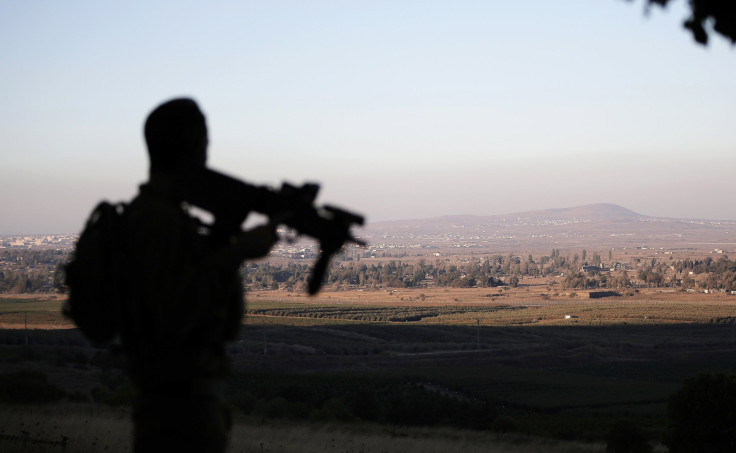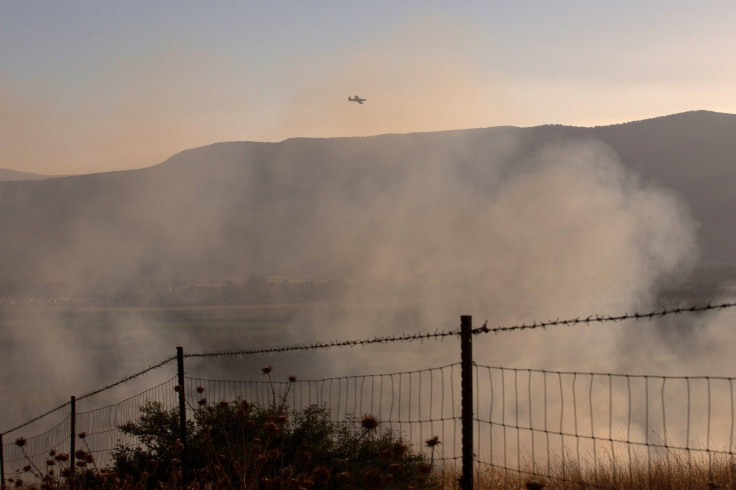Israel-Syria Conflict Heats Up Amid Fears Of Stronger Iranian Proxies After Nuclear Deal

After several months of relative calm, Israel, Syria and Iranian proxy groups fighting in Syria appear to be gearing up for a confrontation that could manifest itself in southern Syria. The Israeli Air Force carried out airstrikes in Syria Thursday after a rocket attack by a suspected Iranian proxy group in Syria.
This was the first rocket attack from Syria to hit Israel since 1973. Tensions between Israel, the Syrian regime and Iranian proxies like the Lebanese Hezbollah militant group are higher than they have been in months. Though it isn’t likely to become a full-scale war right now, all sides are testing their enemies' limits, which could drag Israel further into the fighting in Syria.
Israel “is looking at it from the grand strategic chessboard,” said Phillip Smyth, a University of Maryland researcher who studies ISIS and Shiite militias. “When you see this kind of lighting up after a few months of general quiet, it's a message from Iran that says ‘let’s see what we can do.’ ”
On Thursday, Israel targeted 14 Syrian army positions in Quneitra, a southern Syrian city in the Golan Heights. Reports from the ground claimed that the Syrian army fired anti-aircraft weapons at the Israeli aircrafts. At least five civilians and one Syrian soldier were killed from Israeli strikes, Syria’s state-run SANA news agency reported.
Israel’s strikes were retaliation after four rockets landed in Israeli territory earlier that day, allegedly fired by the Palestinian Islamic Jihad (PIJ), an extremist group native to the Gaza Strip with ties to Hezbollah that is believed to receive funding from the Syria and Iran regimes, a representative of the Israeli Defense Forces said.
“Rockets earlier today were fired by Iran funded Islamic Jihad,” the IDF representative wrote on Twitter. “Syrian government is responsible for attacks emanating from Syria.”
Update: Following today's Iran-sponsored Islamic Jihad rocket attack, the IDF targeted 14 Syrian military posts in the Golan Heights.
— IDF (@IDFSpokesperson) August 20, 2015The PIJ reportedly denied responsibility for the attack. The rocket attacks Thursday landed in open areas of the Golan Heights and Upper Galilee. They were quite different from previous strikes on Israel from Iranian proxies in Syria, which usually target a specific individual or convoy. In January, Hezbollah launched an anti-tank missile on an IDF convoy in the disputed border area in northern Israel, killing two soldiers and wounding at least seven others.
Israel has been anticipating an uptick in attacks from Iran’s proxy groups in Syria since the U.S. signed a nuclear deal with Iran last month. Part of the deal includes lifting international sanctions on Iran that the U.S. believes will improve the lives of Iranian civilians, but according to Israeli Prime Minister Benjamin Netanyahu, it will provide Iran with a “cash bonanza” that would go straight to the regime of Syrian President Bashar Assad and Iran’s proxies.

“There’s no doubt [the nuclear deal] is going to strengthen those Iranian proxy forces throughout the region,” Russell A. Berman, a senior fellow at the Hoover Institution, a public-policy think tank based at Stanford University in California, recently told International Business Times. “Initially it will be a source of moral encouragement. Secondly, it will mean they will be using their resources now in anticipation of greater resources.”
Israel believes that already has begun in Syria. Earlier this year, an offensive in the Golan pushed out the majority of pro-regime Iranian proxies. But in the past few weeks, some factions have re-emerged. According to Israel, this is a sign of a stronger Iran with more powerful proxies.
"The Iranians want to heat up the front against us in the northern and southern Golan,” a senior IDF officer told Ynetnews. "It’s in the Syrian and Iranian interest."
However, Iran’s proxies and the Syrian regime are likely just testing the waters, experts said. Smyth described the attacks as “probes to see how the Israelis will respond,” adding that if Syria or Iran’s proxies “really wanted to light something off, they could.”
© Copyright IBTimes 2024. All rights reserved.





















